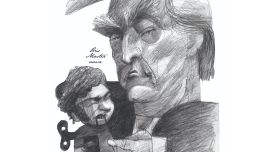After falling at the final hurdle for the third time running in her bid to become Peru's president, Keiko Fujimori stands to lose a lot more than just her dream job: she may also be deprived of her freedom.
Rightwing populist Fujimori's second round presidential election defeat was confirmed on Monday as she finished with 49.87 percent of the votes, just a fraction behind the 50.12 percent that went to leftwing unionist Pedro Castillo.
Just as she did in 2011 and 2016, Fujimori came close to winning in a second round run-off but this third rejection by the country's voters could cost her dearly.
Prosecutors have asked that she be sentenced to more than 30 years in prison for corruption. Winning the presidency would have given her immunity from prosecution.
The 46-year-old, who took over the reins of her jailed father Alberto Fujimori's party 15 years ago, has not given up hope just yet.
Last week she asked for 200,000 votes to be annulled claiming there had been fraud in areas that voted heavily for her opponent.
But a few days later, an anti-corruption prosecutor asked a judge to place Fujimori in pre-trial detention to prevent her interfering with witnesses in her corruption case.
Fujimori is accused of accepting illegal campaign funding as part of the sprawling region-wide Odebrecht scandal.
'Mistake'
She has a history of claiming fraud after a defeat, though.
Five years ago when losing out by just over 40,000 votes to Pedro Pablo Kuczynski – who resigned two years into the job after he was implicated in the Odebrecht scandal – Fujimori had already cried foul.
She would later admit her "mistake."
Given the stakes, it would not be surprising if she is not willing to concede.
Fujimori has already spent a total of 16 months in pre-trial detention.
And there is little sympathy in Peru for rich politicians caught up in the Odebrecht scandal.
Four former presidents have been implicated in the corruption affair, including one, Alan García, who committed suicide when police came to his house to arrest him.
Fujimori's case relates to a 2019 testimony from a former Odebrecht director Luiz Eduardo da Rocha Soares, who claimed to have given a million dollars to Fujimori's Popular Force party for her 2011 election campaign.
Following 28 months of investigations, the prosecutor in charge of the affair, Jose Domingo Perez accused another 41 people of "organised crime, money-laundering, obstructing justice, false statements."
In May, a judge refused a request from Fujimori to be allowed to travel to Ecuador for an international conference on democracy following an invitation from Peruvian Nobel Prize winning author Mario Vargas Llosa.
End of Fujimorism?
The prosecutor's office has also asked that the Popular Force party be dissolved at a time when it has already been significantly weakened at the ballot box having lost a majority in Congress at legislative elections in April that left it with just 24 of 130 seats.
"I fear Fujimorism will be dismembered," analyst Augusto Álvarez, a columnist for the La Republica daily, told AFP.
The heiress of Fujimorism – a mix of authoritarian populism, social conservatism and neoliberal economics that was started by her father – has spent half her life in politics.
In 1994, when her parents separated, she became a sort of substitute first lady aged just 19.
When her father resigned the presidency amidst a scandal and fled to Japan in 2000, she remained in Peru.
She dug in, took over the Popular Force party and relaunched Fujimorism in 2006, at her father's request.
Elected to Congress she carved out a bellicose reputation and went on to reach the second round runoff in three successive presidential elections.
Even this year, when trailing in most polls, she managed to finish in the top two in the April first round.
A mother of two, educated in the United States and married to an American, she has benefitted from her father's enduring popularity amongst a portion of the population that recognised his successes in battling hyperinflation and the Shining Path Marxist guerrilla movement.
– TIMES/AFP


























Comments